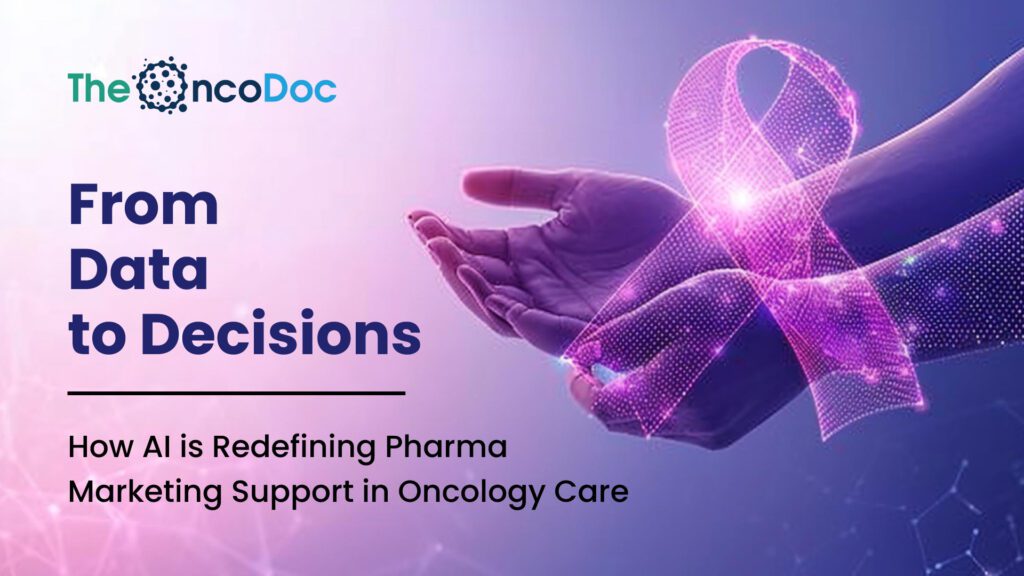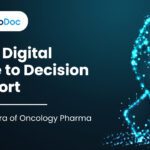Introduction: The New Frontier of Oncology Pharma Marketing
In India’s fast-transforming oncology landscape, pharma marketing is experiencing a fundamental shift. Traditionally, campaigns centered around maximizing visibility, prioritizing reach, frequency, and brand recall. However, today’s oncologists expect more than just promotional messages. They seek tools and content that deliver clinical utility, aid decision-making, and provide timely, data-driven insights that fit into their complex treatment workflows.
This growing expectation has positioned Artificial Intelligence (AI) at the center of oncology pharma marketing strategies. AI-powered platforms now enable pharma brands to move beyond basic engagement metrics like impressions and click-through rates. Instead, they can deliver actionable insights, predictive support tools, and personalized content that directly impact patient care decisions.
The focus is no longer on “How many oncologists saw our message?” but rather on “How effectively did we help oncologists make better, evidence-based treatment choices for their patients?” This new approach emphasizes relevance, precision, and clinical impact.
This article explores how AI-driven solutions are redefining pharma marketing in oncology, helping brands transition from being seen as mere product promoters to becoming valued clinical partners. By integrating AI into content personalization, decision-support tools, patient management programs, and HCP engagement strategies, pharma companies can build lasting trust and deliver real-world value in cancer care.
Section 1: The Growing Complexity of Oncology Decision-Making
Oncology is no longer a one-size-fits-all specialty. The era of personalized medicine has introduced a surge of complexities:
- More than 200 approved cancer drugs across various tumor types
- Growing use of biomarkers, NGS testing, and genetic profiling
- Rising expectations for evidence-based, guideline-aligned therapy decisions
Pharma marketing teams can’t rely on traditional sales pitches anymore. They need tools that offer oncologists data clarity, treatment pathways, and predictive support.
Section 2: AI-Powered Content Personalization for Oncology Specialists
AI is enabling unprecedented levels of content personalization in pharma marketing. No two oncologists have the same patient load, tumor focus, or practice environment.
AI Personalization Capabilities:
- Behavioral Targeting: AI platforms analyze past content engagement to tailor future campaigns. For example, an oncologist who frequently engages with lung cancer resources will automatically receive NSCLC-focused updates.
- Regional Segmentation: AI systems factor in geographic data to align content with regional treatment patterns and patient demographics.
- Timing Optimization: Machine learning algorithms predict the best day and time to send educational assets, increasing open rates and engagement.
Source: Internal analysis from a leading pharma CRM tool (2025)
AI-driven personalization is helping pharma marketers create smarter, not louder, digital campaigns, giving oncologists exactly what they need when they need it.
Section 3: Predictive Analytics for Identifying High-Potential Oncologists
AI platforms can now analyze both historical and real-time data to help pharma brands identify high-potential oncologists for specific therapies.
Key AI Inputs for Predictive Targeting:
- Treatment Behavior History: AI models track prescription patterns to identify likely early adopters for new drug launches.
- KOL Network Influence: Oncologists with high peer influence (as gauged by social listening tools and academic publication networks) are flagged for MSL engagement.
- Digital Engagement Patterns: Frequent users of AI dashboards, clinical calculators, or decision tools are segmented as high-conversion targets.
Source: Oncology Digital Behavior Mapping Study, 2025
This segmentation allows pharma teams to focus field force and digital investments where they are likely to create the most clinical impact.
Section 4: AI-Enabled Clinical Decision Support Tools for Oncologists
Pharma companies are now moving beyond conventional messaging to offer oncologists AI-powered Clinical Decision Support Tools (CDSTs) designed for use during real-time patient care. These tools provide immediate, evidence-based guidance, making them highly valuable in busy oncology practices.
Key AI-Driven Tools Introduced by Pharma Brands:
- Treatment Pathway Recommenders: Interactive platforms that help oncologists select therapy options aligned with established guidelines, based on factors like cancer stage, molecular markers, and patient performance status.
- Toxicity Management Calculators: AI engines that recommend appropriate dose modifications or preventive strategies to manage treatment-related adverse events more effectively.
- Real-World Outcomes Dashboards: AI tools that aggregate and present real-world clinical outcomes data across different patient subgroups, treatment lines, and practice settings, allowing oncologists to compare therapy effectiveness beyond clinical trials.
By offering these AI-driven solutions, pharma brands are not only providing scientific value but also positioning themselves as active facilitators of better clinical decision-making. These tools become integral to the oncologist’s workflow, improving treatment planning speed, safety, and patient outcomes. Ultimately, they help build trust and strengthen the brand’s role as a long-term partner in cancer care delivery.
Section 5: AI for Referral Pathway Optimization in Oncology
Late-stage diagnosis due to delayed referrals remains a critical challenge in Indian oncology care. Pharma brands are now using AI referral dashboards to address this.
How It Works:
- Geo-Heatmaps: AI visualizes referral trends across regions, highlighting districts with low referral-to-diagnosis ratios.
- Auto-Nudge Systems: Primary care physicians receive automated, AI-generated reminders when referral timelines exceed the recommended window for cancer suspicion.
- Predictive Risk Flags: AI models analyze EHR data and flag high-risk patients who should be referred for oncology evaluation.
Source: National Oncology Referral Survey, 2025
This AI-driven approach enables pharma companies to not just promote products but actively strengthen India’s cancer care referral ecosystem.
Section 6: Hyperlocal AI Insights for Regional Oncology Marketing
India’s oncology landscape is regionally diverse. AI allows pharma brands to craft hyperlocal marketing strategies by analyzing:
- Regional Tumor Incidence Patterns: For example, higher gallbladder cancer prevalence in North-East India.
- Practice-Type Distribution: Whether the region has more medical oncologists, hemato-oncologists, or surgical oncologists.
- Infrastructure Gaps: Pharmaceutical companies can customize their teaching programs by using AI algorithms to identify districts that lack diagnostic facilities.
Example:
A pharma brand launching an oral oncolytic for GI cancers used AI tools to focus its campaign on Eastern India, where GI tumor incidence is higher.
Section 7: Harnessing AI-Driven Social Listening for Oncology Insights
With oncologists becoming more active across professional social platforms, medical forums, and closed WhatsApp or Telegram groups, AI-driven social listening has emerged as a powerful tool for pharma marketers. These advanced analytics platforms continuously scan and analyze digital conversations within the oncology community to deliver actionable insights.
Key Applications of AI-Powered Social Listening:
- Monitoring Emerging Clinical Discussions: AI tools help identify trending clinical queries, such as evolving treatment algorithms, biomarker-based therapy sequencing, or resistance management strategies in oncology (e.g., the sequencing of CDK4/6 inhibitors in metastatic breast cancer).
- Spotting Rising Digital KOLs: AI algorithms track patterns of influence, spotlighting oncologists who frequently contribute expert opinions or drive peer engagement in online discussions, helping brands build new advocacy networks.
- Sentiment Analysis Around Therapies and Brands: AI systems can detect shifts in physician sentiment towards specific drug classes, molecules, or brands by analyzing language patterns and discussion volumes over time.
These insights enable pharma brand managers to swiftly recalibrate their content, messaging, and engagement strategies based on what the oncology community is genuinely discussing or concerned about at that moment. This ensures that digital outreach remains relevant, timely, and rooted in real-world clinical conversations. By embedding social listening into their digital marketing workflow, pharma companies can transition from static content dissemination to dynamic, insight-driven communication that resonates with oncologists.
Section 8: Enhancing HCP Engagement Through AI-Powered Chatbots and Virtual MSLs
Pharma companies are deploying AI-based chatbots to provide oncologists with:
- Rapid drug information
- Dosage calculators
- Adverse event management guidelines
- Access to recent clinical publications
For more complex queries, chatbots escalate the conversation to human MSLs, creating a seamless digital-to-human interaction experience.
Benefits:
- Faster query resolution for busy oncologists
- Reduced workload on field force teams
- Increased engagement rates with scientific content
AI chatbots are proving especially useful during off-clinic hours when oncologists are preparing for tumor boards or patient discussions.
Section 9: Leveraging AI in Patient Support Programs (PSPs) for Oncology Therapies
Artificial Intelligence is playing an increasingly vital role in strengthening Patient Support Programs (PSPs), a critical component of oncology brand strategies. These AI-driven initiatives are helping pharma companies move beyond product promotion to actively support patient adherence, education, and overall treatment outcomes.
Key AI-Driven Features in Oncology PSPs:
- Predictive Adherence Tracking: AI models analyze a combination of demographic, behavioral, and clinical data to flag patients who are at a higher risk of therapy non-adherence. This allows care coordinators to intervene proactively with targeted support.
- Automated Follow-Up Scheduling: AI engines help streamline scheduling for lab tests, imaging, and medication refills, reducing the chances of missed appointments or delayed diagnostics. This ensures patients remain on track throughout their treatment journey.
- Personalized Educational Nudges: AI tools generate customized SMS, WhatsApp, or email reminders tailored to each patient’s therapy stage, side-effect profile, and educational needs. These nudges improve awareness about medication timings, potential side effects, and necessary lifestyle adjustments.
Pharma companies implementing AI-enabled PSPs are reporting measurable improvements in patient satisfaction levels and therapy continuation rates. Oncologists also benefit, as these programs reduce their administrative burden and offer assurance that their patients are receiving consistent follow-up and educational support. Ultimately, AI-driven PSPs are helping pharma brands build long-term trust and demonstrate a genuine commitment to patient-centric oncology care.
Section 10: AI-Powered Content Performance Analytics
Traditional CTR and open rates are no longer sufficient. AI-driven analytics now offer pharma marketers deeper insights into content effectiveness:
- Heatmap Analysis: Tracks which sections of digital assets oncologists are spending the most time on.
- Scroll-Depth Tracking: Measures how far HCPs scroll through digital PDFs or microsites.
- Multi-Touch Attribution Modeling: AI determines which combination of webinar invites, emails, and rep calls led to HCP action (e.g., prescribing behavior or tool usage).
These insights allow brand managers to optimize content formats, length, and channel choice.
Section 11: Field Force Enablement Through AI Insights
AI tools are empowering sales reps and MSLs with actionable insights before each HCP interaction:
- Profile-Level Content Engagement Data: Which emails or tools the HCP engaged with recently.
- Personalized Call Objectives: AI suggests talking points relevant to the oncologist’s recent queries or content interactions.
- Geo-Fencing Alerts: Field reps get notified when high-priority oncologists are attending regional CMEs or tumor boards nearby.
Example:
Before meeting a lung cancer specialist, a rep can view AI-generated notes:
“Dr. Sharma recently downloaded your NSCLC sequencing guide and attended your EGFR mutation webinar.”
Such insights improve rep relevance and engagement efficiency.
Section 12: Future Outlook; Generative AI and Oncology Marketing Innovation
Looking ahead, generative AI tools like ChatGPT and Bard will further redefine oncology marketing.
Emerging Use Cases:
- Automated CME Content Creation: Summarizing ASCO or ESMO updates into India-specific HCP newsletters.
- Virtual Tumor Board Simulations: Interactive decision branching and AI-powered case study discussions.
- Voice-Activated Clinical Assistants: Oncologists could soon use voice commands during clinic hours to retrieve dosing guidelines or eligibility criteria for new drugs.
Pharma brands that invest early in these technologies will gain a competitive edge in both clinical relevance and market share.
Conclusion: Transitioning from Promotion to Clinical Partnership; AI as the Driving Force
Artificial Intelligence has evolved beyond being a mere digital marketing tool for pharma companies. It now acts as a strategic catalyst, enabling a deeper alignment between brand objectives and the real-world needs of oncology practice. AI empowers pharma marketers to shift their role, from simply driving awareness to actively supporting oncologists in making informed, evidence-based clinical decisions.
By integrating AI across critical touchpoints such as content personalization, referral pathway optimization, clinical decision support tools, patient adherence programs, and HCP engagement analytics, pharma brands can transform their positioning. They move from being viewed as product promoters to being trusted partners in cancer care delivery.
The oncology care ecosystem values solutions that enhance clinical efficiency, patient outcomes, and decision accuracy. AI-driven interventions allow pharma companies to meet these expectations with relevance and timeliness. The future of oncology pharma marketing will favor brands that leverage AI not for increasing digital noise, but for delivering actionable, precise, and clinically valuable insights at the point of care.
In this new paradigm, meaningful engagement replaces superficial reach, and partnership replaces promotion. Pharma companies that embrace AI as a vehicle for creating real-world impact will not only gain oncologist trust but also drive stronger brand loyalty and long-term market differentiation.
The Oncodoc team is a group of passionate healthcare and marketing professionals dedicated to delivering accurate, engaging, and impactful content. With expertise across medical research, digital strategy, and clinical communication, the team focuses on empowering healthcare professionals and patients alike. Through evidence-based insights and innovative storytelling, Hidoc aims to bridge the gap between medicine and digital engagement, promoting wellness and informed decision-making.



